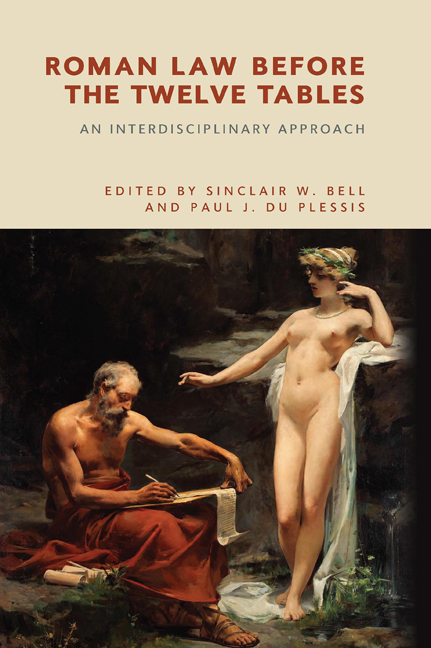Book contents
- Frontmatter
- Contents
- The Contributors
- Introduction: The Dawn of Roman Law
- Part I The Materiality of Roman Law: New Archaeological Discoveries
- 1 Roman Law in its Italic Context
- 2 Central Italian Elite Groups as Aristocratic Houses in the Ninth to Sixth Centuries BCE
- 3 Authority and Display in Sixth-Century Etruria: The Vicchio Stele
- Part II Constructing Early Roman Law: Sources and Methods
- 4 The Twelve Tables and the leges regiae: A Problem of Validity
- 5 The leges regiae in Livy: Narratological and Stylistic Strategies
- 6 The leges regiae through Tradition, Historicity and Invention: A Comparison of Historico-literary and Jurisprudential Sources
- 7 The Laws of the Kings – A View from a Distance
- 8 Beyond the Pomerium: Expansion and Legislative Authority in Archaic Rome
- Part III Roman Law in Historiography and Theory
- 9 Niebuhr and Bachofen: New Forms of Evidence on Roman History
- 10 Finding Melanesia in Ancient Rome: Mauss’ Anthropology of nexum
- Index
7 - The Laws of the Kings – A View from a Distance
Published online by Cambridge University Press: 22 September 2020
- Frontmatter
- Contents
- The Contributors
- Introduction: The Dawn of Roman Law
- Part I The Materiality of Roman Law: New Archaeological Discoveries
- 1 Roman Law in its Italic Context
- 2 Central Italian Elite Groups as Aristocratic Houses in the Ninth to Sixth Centuries BCE
- 3 Authority and Display in Sixth-Century Etruria: The Vicchio Stele
- Part II Constructing Early Roman Law: Sources and Methods
- 4 The Twelve Tables and the leges regiae: A Problem of Validity
- 5 The leges regiae in Livy: Narratological and Stylistic Strategies
- 6 The leges regiae through Tradition, Historicity and Invention: A Comparison of Historico-literary and Jurisprudential Sources
- 7 The Laws of the Kings – A View from a Distance
- 8 Beyond the Pomerium: Expansion and Legislative Authority in Archaic Rome
- Part III Roman Law in Historiography and Theory
- 9 Niebuhr and Bachofen: New Forms of Evidence on Roman History
- 10 Finding Melanesia in Ancient Rome: Mauss’ Anthropology of nexum
- Index
Summary
INTRODUCTION: THE PROBLEM
The problem in front of us is relatively simple to state but complex to solve. What can we say about the earliest legal system of Rome when the sources are so problematic?
One answer to that conundrum, which is well explored in this volume, is to analyse the sources we do have with ever greater care and sophistication. Another answer is to offer a wider context, using comparison with other near-contemporary Mediterranean societies. Both these approaches have value, but both proceed in one form or another from a fundamental tendency to believe that the sources are correct in claiming that there was a law system of sorts prior to the Twelve Tables, and which is attributable to the kings.
This means that we wish to assume a historicity at some level but that we are picking and choosing what level, without any external means of justifying the decision. Very specifically, this refers to the concept of the king itself. In fact, one of the most problematic elements of our tradition is precisely the king. What sort of king the Romans had, and what their role was, can only be determined by the most roundabout of ways, and we often foist an image of a much later time onto the beginnings of Rome.
Is there another way? What I want to try to do is to suggest an account of the emergence of Roman legislation which almost does away with both texts and any reference to the historical narrative. I am of course influenced by my reading of the sources, but I have done my best to leave them to one side. In other words, I want to leave the leges regiae as traditionally understood and ask what sorts of legislation and what sorts of authority might we be able to hypothesise for archaic Rome?
Clearly one way of doing this would have been from a political philosophy point of view, to look at natural law or social contract theory. There were indeed ancient writers who constructed similar models based on various forms of primitivism. However, natural law is itself controversial, and it would be unusual nowadays to read archaic Rome through such a complex and debatable concept, in the manner of a Locke or a Rousseau.
- Type
- Chapter
- Information
- Roman Law before the Twelve TablesAn Interdisciplinary Approach, pp. 111 - 132Publisher: Edinburgh University PressPrint publication year: 2020

